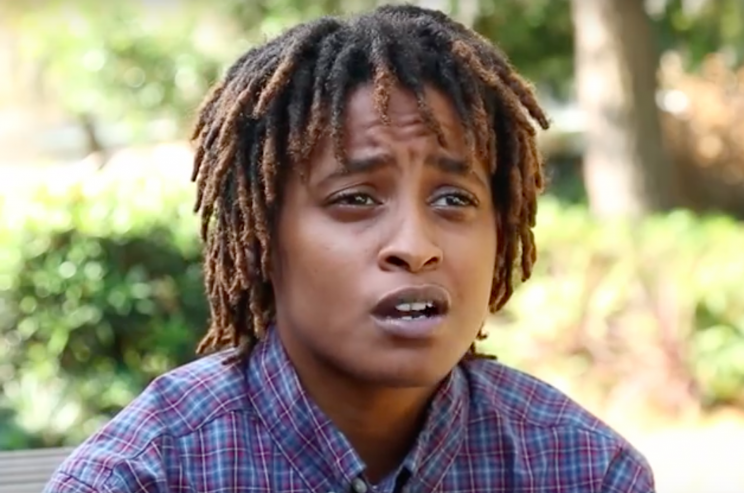A fight over gay employees will almost certainly hit the Supreme Court

This week, on the same day that President Donald Trump announced a ban on transgender military members, the administration weighed in on another issue involving the LGBT community.
That issue is whether Title VII of the Civil Rights Act of 1964 — which forbids discrimination based on sex — protects workers from bias based on their sexual orientation. In a “friend of the court” brief filed Wednesday in a discrimination case in the Second Circuit Court of Appeals, the Department of Justice argued that Title VII does not in fact protect workers from being discriminated against (aka, fired) for being gay.
This interpretation of the law contradicts the official stance of another federal agency — the Equal Employment Opportunity Commission (EEOC), which before Trump was elected, decided that Title VII does protect gay workers. The courts, for their part, are split on the issue.
“I think it’s extremely likely that it will go all the way to the Supreme Court,” says Roberta Kaplan, the lawyer who successfully argued the case against the anti-gay Defense of Marriage Act.
Title VII and discrimination based on “sex stereotyping”
Title VII is a federal law that bars employment discrimination based on race, color, religion, sex, and national origin. Historically, the law’s “sex” provision has often been used to protect female employers from being treated differently from their male counterparts.
But since its original passage in 1964, the law’s bar on sex discrimination has been used to protect workers from “sex stereotyping” and even discrimination based on their sexual orientation.

In 1989, the Supreme Court paved the way for the “sex stereotyping” argument in a decision called Price Waterhouse v. Hopkins. In that case, a Price Waterhouse senior manager named Ann Hopkins claimed that she was denied partnership because she didn’t conform to gender stereotypes. (One partner said she was “macho.” Meanwhile, another advised her to “walk more femininely, talk more femininely, dress more femininely, wear make-up, have her hair styled, and wear jewelry.”)
Ultimately, the high court established that sex stereotyping constitutes sex discrimination. That ruling opened the door for some LGBT workers to file discrimination claims under Title VII — particularly if those workers didn’t fit stereotypes of masculinity or femininity.
“The argument is you’re in part punishing this gay man for not acting manly enough,” says Jeffrey Hirsch, a professor at UNC Law School who specializes in employment discrimination law.
Facing discrimination for whom you’re attracted to
Still, even after the Price Waterhouse ruling, it was difficult for LGBT workers to fight back if they were fired for being gay. As recently as 1991, the Cracker Barrel chain of restaurants adopted an official policy of not hiring gay people and fired at least nine workers under the policy.
At the time, only two states barred discrimination in hiring based on sexual orientation, The New York Times reported. (These days 22 states and Washington, DC bar discrimination based on sexual orientation.)

Speaking of the Cracker Barrel firings back in 1991, William Rubenstein, then-director of the Lesbian and Gay Rights Project for the American Civil Liberties Union, said, “It’s outrageous and incredible, but it’s fair to say that as a general matter it would be very difficult to challenge these discharges other than in one of those places where there is a law specifically prohibiting it.”
That has changed in recent years, as courts have become more amenable to the notion that Title VII shields gay workers.
Here’s how Columbia Law School professor Suzanne Goldberg explained the legal argument supporting Title VII’s application to claims of bias based on sexual orientation: “It’s straightforward … The law prohibits discrimination based on sex and when an employer discriminates against an employee because of the sex of that employees’ partner [or prospective partner] that is sex discrimination.”
The EEOC cites more than a dozen federal cases supporting the argument that Title VII covers sexual-orientation discrimination; many of those cases came after 2015, when the agency itself ruled that discrimination based on sexual orientation is illegal under federal law.
Still, other courts have ruled that, essentially, it is legal to fire or not hire an employee simply because they’re gay. The disagreement among the courts, combined with the split between two federal agencies — the EEOC and the DOJ — suggests the issue is “screaming for some clarification from a fully staffed Supreme Court,” as Hirsch, the UNC law professor stated.
The next hot-button case in the Supreme Court?
While legal experts Yahoo Finance spoke to agreed the issue will hit the Supreme Court, it’s not entirely clear whose case will actually go before the justices. The Second Circuit case the Trump administration weighed in on involved a skydiving instructor claiming he got fired after disclosing to a customer that he was gay. While that appeals court ruled against the skydiving instructor, the full court is reconsidering his case in September. Either side may end up petitioning that case to the Supreme Court. (While the instructor has since died, his case is being pursued by his estate.)
If that case doesn’t reach the Supreme Court, then the Supreme Court may end up considering the case of Jameka Evans, a lesbian who presented as masculine and claimed she was harassed, physically assaulted, and denied equal pay at her job as a security guard at Georgia Regional Hospital. The 11th Circuit Court of Appeals in Georgia ruled that Congress never meant for Title VII to apply to sexual orientation.
“Because Congress has not made sexual orientation a protected class, the appropriate venue for pressing the argument … is before Congress, not this Court,” the court ruled.
If, and arguably when, the Supreme Court takes up this issue, the decision will likely be a close one that will depend on two justices who have reliably “swung” in politically charged cases.
“Like any issue of this kind of importance and controversy, the one thing I can predict is that the Supreme Court vote is going to be very close,” says Kaplan, the attorney who worked on the DOMA case. “It’s not going to be a huge majority one way or the other. As to which way it comes down, as in many cases that raise this type of issue, it is likely that the outcome will depend on the vote of Justice Kennedy and perhaps Chief Justice Roberts.”
At the end of the day, this case likely won’t force large multinational and national corporations to change their policies because many already bar discrimination based on sexual orientation.
“Many, many national and global corporations prohibit sexual orientation discrimination against their LGBT employees,” Goldberg said. “In fact, the number of employers willing to stand up and argue that it is okay to fire someone because they’re gay is shrinking.”
Still, if the Supreme Court ends up taking this case on and ruling for the employees, it will make it a lot easier for LGBT workers to file federal discrimination lawsuits, regardless of their employers’ internal policies.
Erin Fuchs is deputy managing editor of Yahoo Finance.
Read more:
A legal fight over New York City dogsitters highlights a bigger problem in America
FTC likely to approve Whole Foods deal even if Amazon did deceive customers
Why Mark Cuban is throwing his weight behind an arcane Supreme Court case

 Yahoo Finance
Yahoo Finance 
